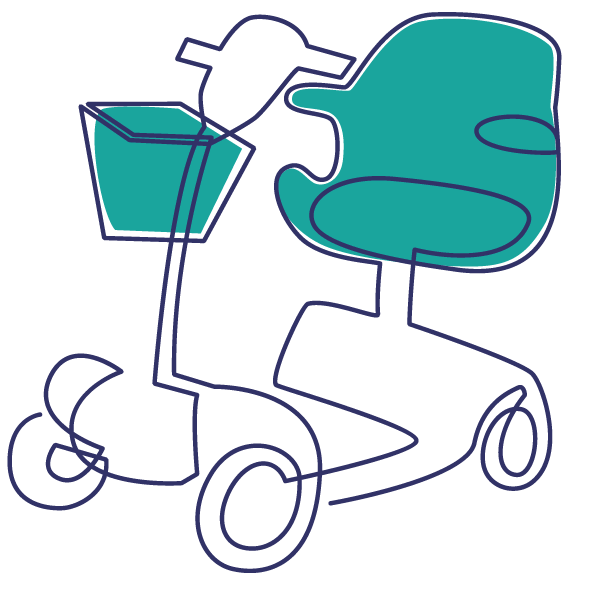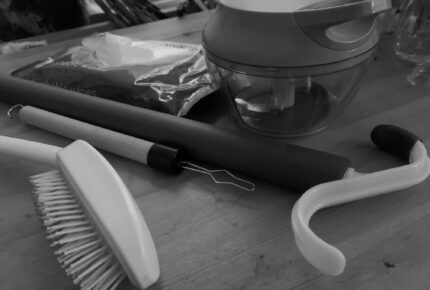Overview
Home adaptations can help people who are disabled to live independently in their own homes. This information guide describes the help available that may help to pay for significant changes your home.
Housing adaptations can help you live safely and independently in your own home by:
- Reducing the risk of accidents at home.
- Reducing the need for home care or going into a care home.
People who are disabled may get help with a wide range of adaptations to their home. This includes, but not limited to:
- Replacing a bath with a level access shower.
- Making it easier to get into and out of the house by widening doors or making a ramp.
- Fitting lower worktops in a kitchen.
Home repairs, improvements and adaptations – Citizens Advice Scotland
Home Owners
As a starting point, contact your local authority social work department and ask for an Assessment of Need.
An assessment of need is usually carried out by an Occupational Therapist (O.T.)
Councils will only offer financial help if the assessment confirms that the adaptations are essential.
The Scheme of Assistance allows councils to decide what help to provide to home owners, which may be – advice and guidance, practical help, or financial assistance by way of grants or loans.
The scheme of assistance for house repairs and adaptations – Citizens Advice Scotland
Housing Association Tenants
Housing Associations can advise you about how to get an assessment and will let you know what support is available.
Housing Associations can carry out adaptations to a home if they feel the work is essential, and if there is funding available.
Sometimes it may not be possible to adapt a home to meet your needs. This may be because:
- There is not enough space to make the changes needed, or:
- The way the house is built makes it difficult or impossible to change.
The Housing Association may then suggest other solutions, such as moving to a different property.
Private tenants
If you are a private tenant you can:
- Contact your local authority for an assessment to see whether the changes needed to your home meet the conditions for essential work.
- You must ask for permission from your landlord.
- You should also say if you intend to put the property back to its original state when you leave.
- Your landlord must not ‘unreasonably refuse to give their consent’ (ie must not say no without very good reasons.)
- If your landlord does say no, they must tell you in writing why they have said no.
What if I want to do the adaptations myself?
- If you do not own your home, you will need to write to the council, housing association or private landlord to ask for permission first.
- Your landlord ‘cannot withhold their consent unreasonably’, but they can make certain conditions.
Some building work to a disabled person’s private home may also be VAT exempt. Call the VAT helpline for more information on 0300 200 3700 or contact us for a copy of our Claiming VAT exemption on disability products info guide.
Care and Repair
Care and Repair services operate throughout Scotland. They offer:
- Independent advice and assistance to help homeowners repair, improve or adapt their homes so that they can live in comfort and safety.
- The service is available to home-owners, private tenants and crofters who are aged over 60 or who have a disability.
- Some Care and Repair services also include home-owners of any age group with physical or mental disabilities, private rented sector and crofting tenants (particularly in the Highlands and Islands).
Contact Care and Repair services at http://www.careandrepairscotland.co.uk
Scottish Welfare Fund
You may be able to get a Community Care Grant from the Scottish Welfare Fund if:
- You are moving out of a care home, hospital or similar place and need to make minor improvements to your home so you can live there independently, or
- You need to get your home adapted so you can stay there instead of moving into a care home.
- You have to have a low income to be able to apply for a Community Care Grant
- To apply, contact your local council.
A list of telephone numbers and email addresses for each local council is available on the Scottish Government website at: https://www.mygov.scot/scottish-welfare-fund/
Unhappy with the decision?
If you are not happy with the decision regarding your eligibility for a disabled home adaptation, you can complain to the council. To make a complaint, contact the person you last spoke to about it, or to the local authority’s Complaints Officer.
Get advice from your local Citizens Advice Bureau if you
Information last updated on 31 January 2024. Please note that information may be subject to change. All information is provided in good faith but Disability Information Scotland does not endorse any product or service referred to within this resource.
If you would like this information guide in another version then please contact us and we will post or email you a copy.
Aids, Equipment and Adaptations:Frequently Asked Questions
Through our helpline we receive enquiries spanning a wide range of different topics. Here is a selection of those most asked:
Council Help for Disabled People
Scottish councils have responsibilities to help disabled people and their carers who qualify for help. These include:
- Financial help
- Care needs assessments for disabled people
- Providing support for carers
- Blue Badges
- Safeguarding people who are at risk of harm
Financial help
Councils are responsible for providing financial help, including
- Housing benefit – help with rent for people over State Pension age and for some younger people in special circumstances Claim Housing Benefit – mygov.scot
- Means-tested and non means-tested help with council tax costs Working out your council tax – mygov.scot
- Lump sum payments from the Scottish Welfare Fund; Crisis Grants (usually food, energy, or heating) or Community Care Grants to help people stay in, or settle into the community. https://www.mygov.scot/scottish-welfare-fund
Social work departments have powers to help with “Section 12” payments, for adults or children in an emergency if this would save the council costs in future. They can also make payments to promote the welfare of children in need.
Councils must also have a Housing “scheme of assistance” that may give information, advice, grants, loans, and practical assistance to homeowners or, to private tenants who need disability adaptations. https://scotland.shelter.org.uk/professional_resources/legal/housing_conditions/scheme_of_assistance
Most council areas will have a Care and Repair service that will provide advice and help to older people and (in some areas) disabled people who are homeowners or private tenants. Find your local service here Office Locations | Care and Repair Scotland
Care needs assessments for disabled people
If you are disabled, your council’s social work department (or in Highland, NHS Highland) can assess your care needs, and agree a care plan to support you. The help you receive may include equipment, adaptations to your home, care at home, day care or a care home. Any help you receive that is classed as “personal care” is free.
You should be offered a choice in how your care is provided; this is called Self-directed support. Your options within your budget form the council are:
- 1 – a direct payment to you or someone else (such as a care agency) to pay for your own support
- 2 – you arrange the support
- 3 – the local council arranges the support
- 4 – a mix of the above
Support for carers
The Carers (Scotland) Act gives carers a right to support from their local council. A carer is anyone who is not paid for their caring and looks after a friend, family member or neighbour who is disabled. You do not have to be caring for a specific number of hours to be a carer.
Your local Carers Centre can explain what help is available locally. Any help a carer received from their local council is free. Find your local Carers Centre here https://www.careinfoscotland.scot/topics/support-for-carers/carer-centres/ and find out more about carers rights here https://www.careinfoscotland.scot/topics/support-for-carers/
Blue Badges
A Blue Badges provides parking concessions for on-street parking, some car parks, and disabled parking bays, allowing badge holders to park close to where they need to go
A Blue Badge belongs to a person, not a vehicle, so they can travel as a driver or a passenger. Find out more about Blue Badges here: https://www.mygov.scot/apply-blue-badge/eligibility
Protecting people who are at risk of harm
Councils have powers under the Adult Support and Protection (Scotland) Act 2007 to protect adults who cannot look after their own safety and security and are at risk of harm because of disability, mental disorder, illness, physical or mental infirmity, sexual harm or institutional harm.
“Harm” means injury or damage and includes self-harm, neglect and abuse.
Councils and other public services (such as Police) will work together to support people. You can find out more here https://www.gov.scot/policies/social-care/adult-support-and-protection/
If you are worried that someone at risk of harm, you can find your local social work department here
Contact your council
You can find details of your council and its services here Organisations – mygov.scot
How can I get care or disability equipment at home?
If you need care, support or equipment at home, the first step is to contact your local council’s Social Work Department (or in Highland, NHS Highland) and ask for a Care needs assessment. You might qualify for an adaptation, equipment, care at home, or a budget you can use to arrange your own care. If you have a carer, they have a separate right to support from the council too. If the help you need counts as “free personal or nursing care” it will be free.
Aids, Equipment and Adaptations:Search for Local Organisations
Our quick search tool can connect you to over 3000 service providers, suppliers and organisations supporting people across Scotland. To find support near you, simply enter your search term and select your local authority.
| Organisation | Description |
|---|---|
| West Audio | Services provided: Induction Loops – Design Installation & Certification: Accredited induction loop system designers and installers ISCVE – accredited hearing loop assessors Design and Certification to EN BS 60018-4 (2006) Churches, care homes, pub… |
| WestMARC NHS Department, NHS Greater Glasgow & Clyde | Repair and maintain wheelchairs supplied by WestMARC and the NHS |
| Wheelchair Accessible Vehicles (WAVs) | A guide provides information on vehicles that allow you to travel in your wheelchair |
| Wheelchair Travel Ltd | Independent transport service for disabled people |
| Wheels to Heal | We recycle unwanted mobility aids. You can donate used items, such as wheelchairs (manual and electric), zimmer frames, rollators, commodes, walking sticks, crutches, hoists and medical beds and much more to send them overseas to provide the gift of mo… |
| White Rose Collection | Make products for people who have had a stoma |
| Widefit Shoes | Specialise in fitted shoes for disabled and elderly people |
| Wiltshire Farm Foods | Frozen meal home delivery service |
| Winter Sports Accessible Resort Guide | Find accessible winter sports resorts in Europe |
| Woodside Dog Agility Club | Description of service: Vehicle conversion and adaptation for drivers and passengers, e.g. hand controls, boot hoists to lift wheelchairs, left foot throttle and person lifts etc. Open Mon to Thursday 09:00 – 17:00 and Fridays 09:00 – 16:00 Additional… |

